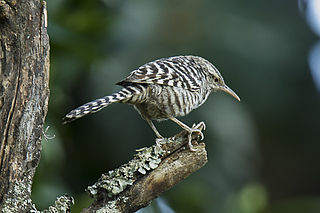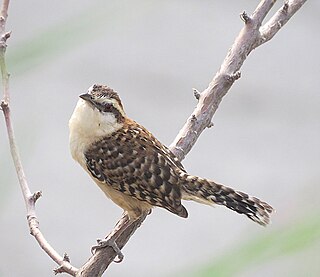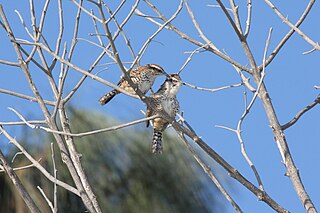 W
WCampylorhynchus is a genus of wrens, which has at least 15 described species. At 17–22 cm (6.8-8.7 in) long, these are the largest-bodied of wrens, including the largest species, the giant wren. Member species are found in South and Central America and in some cases, as far north as the southwestern United States.
 W
WThe band-backed wren is a small songbird of the wren family.
 W
WThe bicolored wren is a species of bird in the family Troglodytidae. It is found in Colombia, Venezuela, Guyana, and Brazil.
 W
WBoucard's wren is a species of bird in the family Troglodytidae. It is endemic to Mexico.
 W
WThe cactus wren is a species of wren endemic to the deserts of the southwestern United States and northern and central Mexico. It is the state bird of Arizona, and the largest wren in the United States. Its plumage is brown, with black and white spots as markings. It has a distinctive white eyebrow that sweeps to the nape of the neck. The chest is white, whereas the underparts are cinnamon-buff colored. Both sexes appear similar. The tail, as well as flight feathers, are barred in black and white. Their song is a loud raspy chirrup; akin in the description of some ornithologists to the sound of a car engine that will not start. It is well-adapted to its native desert environment, and the birds can meet their water needs from their diet which consists chiefly of insects, but also of some plant matter. The cactus wren is a poor flier and generally forages for food on the ground. Ornithologists generally recognize seven subspecies, with the exact taxonomy under dispute.
 W
WThe fasciated wren is a species of bird in the family Troglodytidae. It is found in Ecuador and Peru.
 W
WThe giant wren is a species of bird in the family Troglodytidae. It is found in Mexico and Guatemala.
 W
WThe gray-barred wren is a species of bird in the family Troglodytidae. It is endemic to Mexico.
 W
WThe rufous-backed wren is a songbird of the family Troglodytidae. It is a resident breeding species from southwest Mexico to northwestern Costa Rica.
 W
WSclater's wren is a songbird of the family Troglodytidae. It is endemic to Mexico.
 W
WThe spotted wren is a species of bird in the family Troglodytidae. It is endemic to Mexico.
 W
WThe stripe-backed wren is a bird found in the savannas of northern Colombia and central Venezuela. It lives in dry, riparian woodland, or farmlands, and is found at heights up to 800 m.
 W
WThe thrush-like wren is a South American species of bird in the family Troglodytidae, the wrens. As suggested by its common and scientific name, its size and coloration are vaguely reminiscent of that of a thrush, although the general impression it gives in life is very different and not at all "thrush-like".
 W
WThe Veracruz wren is a songbird of the family Troglodytidae. It is endemic to Mexico.
 W
WThe white-headed wren is a species of bird in the family Troglodytidae. It is found in Colombia and Panama.
 W
WThe Yucatan wren is a species of bird in the family Troglodytidae. It is endemic to Mexico. Its natural habitat is subtropical or tropical dry shrubland, and it is only found on the narrow coastal strip of the northern Yucatán Peninsula. One of the key habitats of this species is the Petenes mangroves ecoregion of the Yucatan coast. It is threatened by habitat destruction.